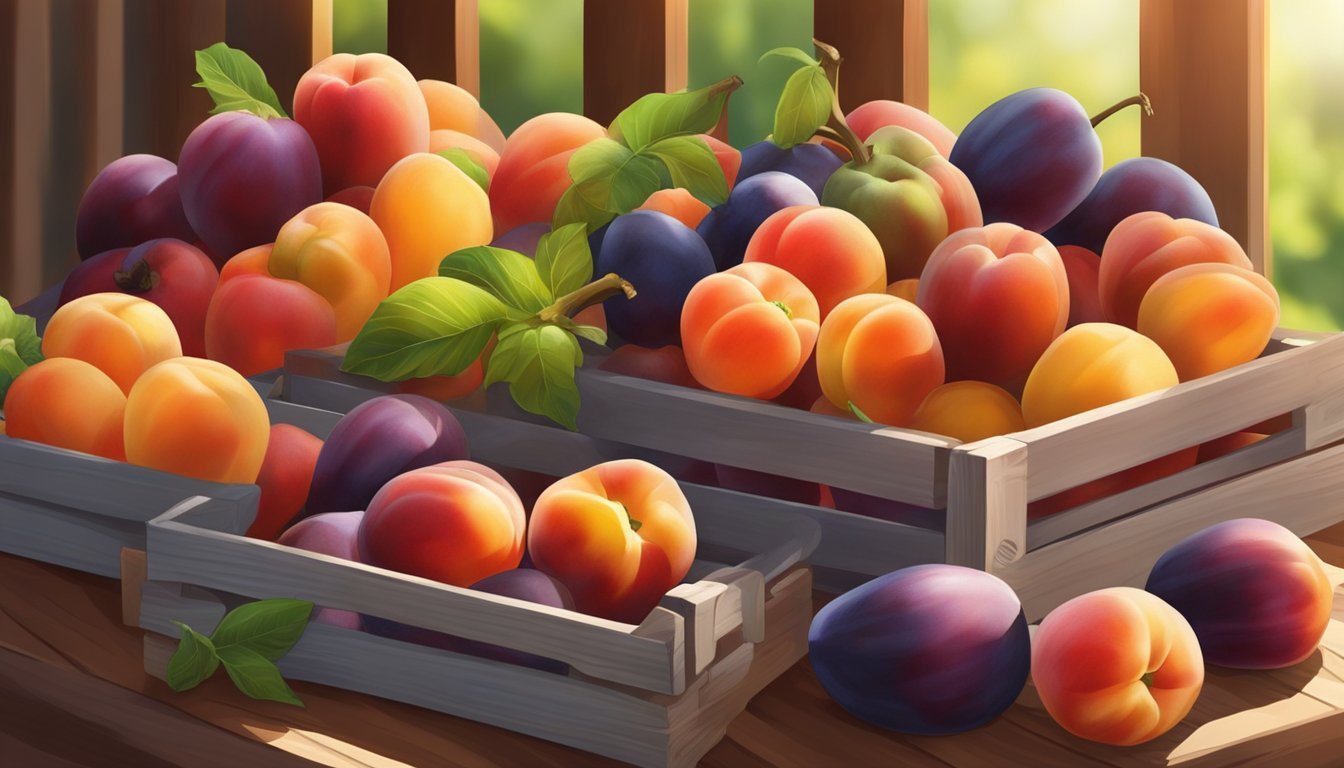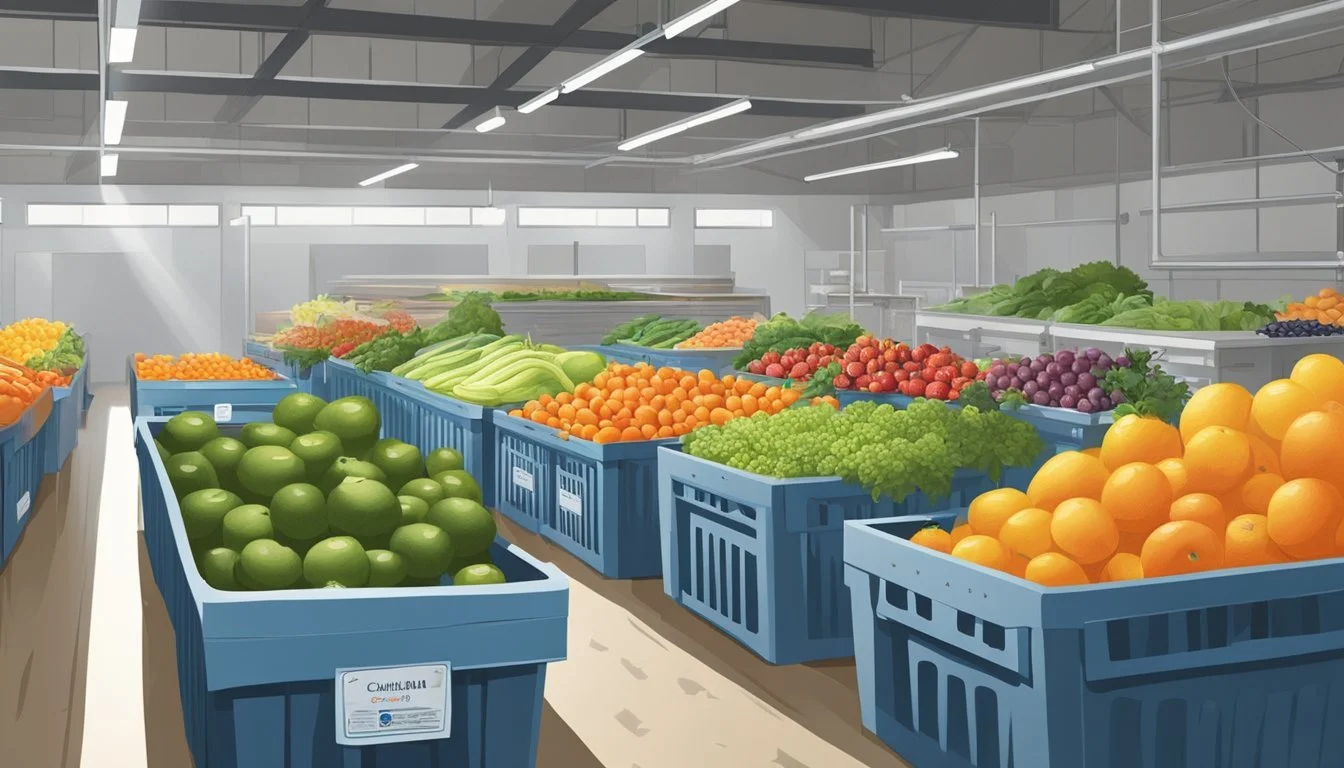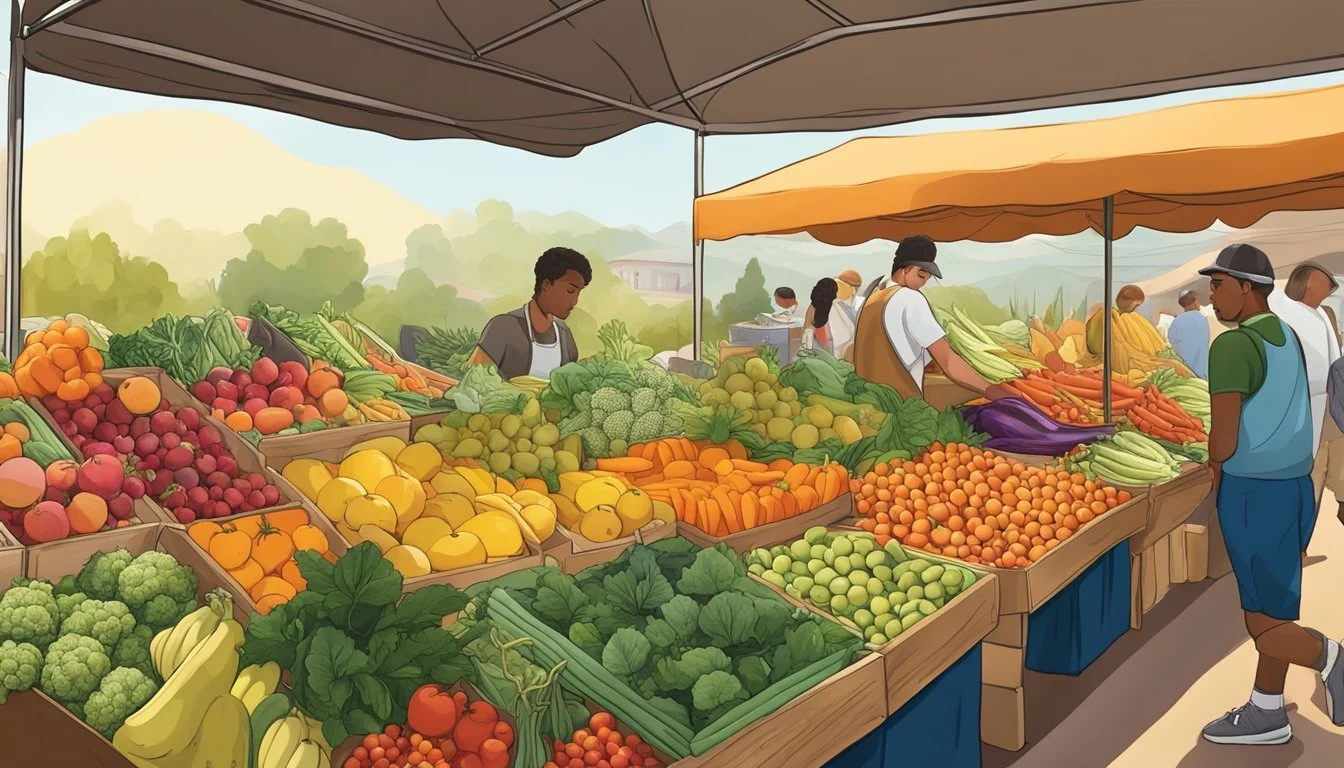California Seasonal Fruit & Vegetables in September
Your Fresh Guide
This Article is Part of our California Seasonal Fruit & Veg Calendar
In California, the turn of the season from summer to fall in September brings forth a cornucopia of fresh produce. Amid the state's varied climates, September is a unique month that straddles the warm end of summer and the beginning of autumn, allowing for a diverse harvest of fruits (What wine goes well with fruits?) and vegetables. California's agricultural abundance is evident in the range of seasonal produce that becomes available during this time.
Fruit lovers can delight in the continued availability of summer favorites such as nectarines and plums, which generally remain in season until early September. Concurrently, early fall fruits like apples begin to peak, offering a fresh taste that's synonymous with the onset of cooler days. Vegetables like watermelons enjoy an extended season, often harvested through September, ensuring their sweet, hydrating qualities can still be enjoyed as the season starts to shift.
September's produce variety is perfectly positioned for consumers looking to savor the last bits of summer while gradually embracing the flavors of fall. Whether shopping at farmers' markets or grocery stores, individuals in California can expect to find a vibrant selection of fruits and vegetables that reflect the seasonal transition, providing ample inspiration for both refreshing summer dishes and heartier autumnal fare.
What's In Season
Throughout September in California, there is an abundant transition of produce as summer gives way to fall. This richness in seasonal change is reflected in the variety of fruits and vegetables reaching their peak harvest time.
Fruit Highlights
During September, California enjoys a wealth of fruit ripe for the picking. The variety includes but is not limited to:
Apples: A diverse selection begins to reach maturity, offering crisp and juicy flavors.
Plums: Sweet and succulent, these stone fruits are a late-summer favorite.
Berries: Although the tail end, some berry varieties like raspberries are still available.
Figs: With their unique flavor and texture, figs are well into their season.
Grapes: Vineyards are bustling as grape harvests are underway, perfect for snacking or winemaking.
Pears: Ripe and ready, pears provide a soft, buttery indulgence.
Raspberries: Delicate and flavorful, these berries can still be found in early fall.
Vegetable Highlights
Vegetable gardens and farms are equally as robust in September:
Squash: Varieties of squash showcase their versatility and are perfect for autumnal dishes.
Beets (how long do beets last?): Earthy and rich, beets are in good supply.
Potatoes: A staple in many cuisines, potatoes are hearty and abundant.
Radish: Crisp radishes add a peppery note to salads and dishes.
Beans: Snap beans are rounding off their peak season with tender pods.
Tomatoes: Tomatoes are still bountiful, with harvests continuing throughout the month.
Corn: Sweet corn remains a seasonal treat in early fall.
Peppers: From sweet to spicy, peppers add a burst of flavor and color.
Eggplant (how long does eggplant last?): With their glossy skins, eggplants are plump and perfect for harvest.
September Harvest
In September, California's farms are bustling with activity as the state's prime agricultural lands yield a bountiful harvest of fruits and vegetables. This month is known for the ripening of a variety of produce, with particular emphasis on the transition from summer to fall crops.
Fruit Harvesting
September in California welcomes the peak season for several fruits. Grapes, with their vast range of varieties, are being picked throughout vineyards, promising a rich production of both table grapes and those destined for winemaking. Figs, fragrant and sweet, are also in full harvest, offering their unique flavor to the palate. Apples begin to reach maturity, signaling the start of their picking season, while pears and raspberries continue to thrive, providing fresh flavors that bridge the summer and autumn months.
Grapes: Picked throughout the month
Figs: Harvested at their peak sweetness
Apples: Begin to be harvested
Pears: Available and ripe
Raspberries: Continue from late summer into early fall
Vegetable Harvesting
As for vegetables, the September harvest is equally impressive. Tomatoes are still in abundance, their rich lusciousness a testament to the warm summer that's passing. Corn stands tall and ready, its kernels at the peak of sweetness. Versatile squash varieties begin to make a more prominent appearance, hinting at the coming of fall. Gardeners and farmers are busy picking eggplant, beans, and peppers, which remain robust and plentiful. Furthermore, radishes are quick to grow and are frequently harvested, adding a peppery crunch to dishes.
Tomatoes: Plentiful, nearing the end of the season
Corn: Sweet and ready for harvest
Squash: Starts to become more prevalent
Eggplant: Continues to be harvested
Beans: Available in various varieties
Peppers: Ripe and ready
Radishes: Quick to mature and harvested often
Preparation and Storage
Proper storage of fruits and vegetables is essential for maintaining freshness and flavor. This section provides specific methods for storing common seasonal produce in California during September.
Storing Fruits
Apples: Apples should be kept in a plastic bag in the crisping drawer of the refrigerator to stay fresh and crisp. If they are stored correctly, apples can remain fresh for several weeks.
Plums: They should be stored at room temperature until they ripen. Once ripe, plums can be moved to the refrigerator to prolong their freshness.
Figs: Figs are delicate and perishable. For best results, store them in a shallow container in the refrigerator and consume them within a few days.
Berries: Refrigerate berries, unwashed, in their original container or spread out on a paper towel-lined container to prevent mold. It's best to eat berries soon after purchasing, as they do not have a long shelf life.
Storing Vegetables
Potatoes: They should be stored in a cool, dark, well-ventilated place, not in the refrigerator. Refrigeration can cause potatoes to develop a sweet taste and darken when cooked.
Corn: For the sweetest corn, consume it as soon as possible. If needed, store corn in the refrigerator with the husks on to keep it fresh and maintain its taste.
Beets: Remove the tops and store beets in the refrigerator in a plastic bag. They will stay crisp and fresh for several weeks when stored properly.
Squash: Store squash in a cool, well-ventilated area for up to a month. If cut, wrap the squash in plastic and refrigerate it, but it is best consumed within a week.
Seasonal Recipes
As September marks the peak harvest for a variety of fruits and vegetables in California, the culinary focus shifts towards recipes that celebrate the freshest produce available. From sweet pears and crisp apples to succulent grapes and hearty vegetables like squash and tomatoes, there is an abundance of flavors to be captured in creative and nutritious dishes.
Fruit Recipes
Pears: They are versatile and can be used in both sweet and savory dishes. A classic Pear Tarte Tatin showcases the fruit's delicate texture while a Pear and Gorgonzola Pizza provides a satisfying balance of flavors.
Pear Tarte Tatin:
Peel and slice pears
Caramelize with butter and sugar in a pan
Cover with puff pastry and bake until golden
Pear and Gorgonzola Pizza:
Prepare a pizza dough base
Top with slices of pear, crumbled Gorgonzola, and walnuts
Bake until the crust is crispy and cheese is melted
Apples: In September, apples are at their best and can be transformed into a comforting Apple Crisp or blended into a Creamy Apple Soup for cooler evenings.
Apple Crisp:
Combine sliced apples with cinnamon and sugar
Top with a mixture of oats, flour, butter, and more sugar
Bake until the topping is crunchy and apples are tender
Creamy Apple Soup:
Sauté apples with onions and spices
Puree until smooth after adding vegetable stock
Finish with a swirl of cream for richness
Grapes: With their natural sweetness, grapes can be roasted to concentrate their flavors, adding a burst of taste to Roasted Grape and Ricotta Crostini.
Roasted Grape and Ricotta Crostini:
Roast grapes in the oven until they start to burst
Spread ricotta on toasted slices of baguette
Top with roasted grapes and a drizzle of honey
Vegetable Recipes
Squash: Squash is a harbinger of autumn and works wonderfully in a Roasted Butternut Squash Salad or as a filling for Squash Ravioli.
Roasted Butternut Squash Salad:
Cube and roast butternut squash until caramelized
Toss with mixed greens, goat cheese, and a vinaigrette
Add toasted nuts (how long do nuts last?) for crunch
Squash Ravioli:
Roast and puree butternut squash for filling
Prepare homemade pasta or use wonton wrappers to encase the filling
Serve with a sage brown butter sauce
Tomatoes: Fresh, ripe tomatoes in September can elevate a simple Caprese Salad (What wine goes well with caprese salad?) to new heights or serve as the foundation for a robust Tomato Basil (how long does basil last?) Soup.
Caprese Salad:
Slice fresh tomatoes and mozzarella
Layer with basil leaves
Drizzle with balsamic reduction and olive oil
Tomato Basil Soup:
Cook down tomatoes with onions, garlic, and chicken stock
Blend until smooth and stir in fresh basil
Serve with a dollop of pesto or croutons (how long do croutons last?)
Beans: Fresh beans can be quickly blanched and included in a Green Bean Almondine or cooked down into a comforting White Bean and Tomato Stew.
Green Bean Almondine:
Blanch green beans and sauté with slivered almonds and butter
Season with lemon juice, salt, and pepper
White Bean and Tomato Stew:
Sauté onions and garlic, then add tomatoes and cooked white beans
Simmer with herbs and stock until flavors meld
Finish with a drizzle of olive oil and fresh basil
These recipes not only celebrate the seasonal bounty but also cater to a variety of tastes, ensuring there's something special for every palate to enjoy during California's September harvest.
Health Benefits
Eating seasonal fruits and vegetables in September offers many health benefits for Californians. Seasonal produce tends to be fresher and, as a consequence, richer in nutrients.
For instance, pumpkins, a September staple, are a powerhouse of vitamins, boosting immunity with their high vitamin A content. They are also recognized for their ability to promote healthy skin and eyes, and reduce inflammation.
In addition to pumpkins, September's produce includes stone fruits like peaches and plums, which are sources of antioxidants and vitamin C. The raw consumption of these fruits maximizes their nutritional potential, contributing to a healthy diet and aiding in cancer prevention.
Berries, still available from summer, provide essential fibers and antioxidants. Regular inclusion of berries in the diet is associated with improved digestion and a lower disease risk.
Here's a quick overview of some seasonal offerings and their benefits:
Fruit/Vegetable Nutrient Benefits Pumpkin Vitamin A, Eye Health, Immune Support Stone Fruits Antioxidants, Vitamin C, Skin Health Berries Fiber, Antioxidants, Digestive Health
Emphasizing seasonal and raw vegetables within their diet can help Californians meet the recommended daily intake of 1.5-2 cups of fruits and 2-3 cups of vegetables, as fresh produce is more likely to be consumed in its whole, unprocessed form. This practice not only supports personal health but also encourages sustainable eating habits by aligning with the natural growing seasons.
Sustainability and Local Produce
California is known for its commitment to sustainability, particularly when it comes to its harvest practices for fruits and vegetables. Local produce, by virtue of being grown and consumed within the state, inherently has a lesser environmental impact. The reduced transportation distance equates to less fuel usage and fewer carbon emissions. This is especially true for fruits and vegetables bought in September—typically a harvest period for a diverse range of crops.
Consumers can find a cornucopia of seasonal and sustainable produce at their local grocery stores or farmers' markets. Here's an illustrative list of September harvests that support sustainability:
Pomegranates: A rich source of antioxidants, these fruits are typically harvested beginning in late summer through early winter in California.
Persimmons: They come into season in September and offer a sweet and honey-like flavor.
Figs: Late summer to fall is the best time to enjoy this nutritious fruit.
Citrus Fruits: Like oranges, which are available year-round but often have varieties that peak in early fall.
Table Grapes: September is often the peak season for this versatile fruit.
Kiwi: Often begins in October but can be found in late September.
Choosing to purchase these items locally not only supports regional agriculture but also assures consumers of the freshest produce. It bolsters the local economy and sustains the agricultural community. Moreover, local farmers are more likely to employ responsible farming practices, including water conservation and organic methods, which align with the state's sustainable ethos. Consequently, when Californians opt for local fruits and vegetables from their grocery store or market, they are making a sustainable choice for their community and the environment.






